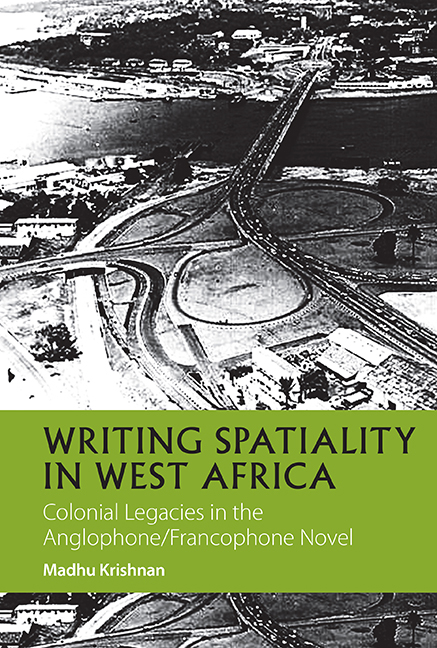Book contents
- Frontmatter
- Contents
- Acknowledgements
- Abbreviations
- Introduction
- 1 Spatiality from Empire to Independence
- 2 Post-independence Disillusionment and Spatial Closures
- 3 Social Space Beyond the Public Sphere: Women's Writing and Contested Hegemonies
- 4 Cosmopolitanism, Migration and Neoliberalism in the Wake of Structural Adjustment
- Conclusion
- Bibliography
- Index
2 - Post-independence Disillusionment and Spatial Closures
Published online by Cambridge University Press: 15 October 2019
- Frontmatter
- Contents
- Acknowledgements
- Abbreviations
- Introduction
- 1 Spatiality from Empire to Independence
- 2 Post-independence Disillusionment and Spatial Closures
- 3 Social Space Beyond the Public Sphere: Women's Writing and Contested Hegemonies
- 4 Cosmopolitanism, Migration and Neoliberalism in the Wake of Structural Adjustment
- Conclusion
- Bibliography
- Index
Summary
In this chapter, I move from the period spanning the last days of formal colonisation and nominal independence to the post-independence period of the 1960s and 1970s. In so doing, I take up one of the key themes from the previous chapter through a focus on the proliferation of development agendas in West Africa in the period following World War II. Globally speaking, the period between the 1950s and 1970s was marked by a transformation in the large-scale global geographies of capitalism, characterised by ‘deindustrialization and regional decline, gentrification and extrametropolitan growth, the industrialization of the Third World and a new international division of labor, intensified nationalism and a new geopolitics of war’, not as discrete phenomena but as ‘symptoms of a much deeper transformation’ that spanned continents and regions. While it is certainly the case that these tendencies began to manifest well before the post-independence period, it is equally true that, with the continued integration of ostensibly independent new territories into the landscape of the global economy, the development of capitalism as ‘a world-system that is also, uniquely and for the first time, a world system’ reached new heights of intensification. Indeed, when taking into consideration of ‘capitalisation’ of the world and the ‘worlding’ of capital, the post-independence years, as numerous scholars of political economic history have noted, was a time of particular entrenchment and intensification. At the same time, patterns of migration and urbanisation were changing, with natural growth augmented by rural–urban drift, which, in contrast to the circular migration of previous eras, was largely one-way in character. In the West African context, this period is particularly significant for the rapid rate of urban growth across the region, coupled with a strong emphasis on nationally determined modernisation plans aimed at the growth of the economy within a world-capitalist system; the amelioration of social welfare as a means of redressing rural–urban drift; and the reproduction of a stable and disciplined labour force. Despite the proliferation of four-, five- and ten-year plans in the countries of the region targeted towards these goals, however, few of these aims were ever realised on any large scale, giving rise to the phenomenon of ‘post-independence disillusionment’.
- Type
- Chapter
- Information
- Writing Spatiality in West AfricaColonial Legacies in the Anglophone/Francophone Novel, pp. 59 - 96Publisher: Boydell & BrewerPrint publication year: 2018

